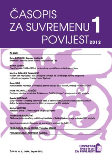Oblikovanje bunjevačkog političkog identiteta u Bačkoj tijekom druge polovine XIX. stoljeća
THE FORMATION OF THE POLITICAL IDENTITY OF THE BUNJEVCI IN BAČKA DURING THE SECOND HALF OF THE 19TH CENTURY
Author(s): Robert SkenderovićSubject(s): History
Published by: Hrvatski institut za povijest
Keywords: Croats of Bačka; Bunjevci; Šokci; political identity; ethno-cultural identity; Croatian national movement
Summary/Abstract: The political identity of the Bunjevci came into existence as a reaction of the Croats of Bačka to the social, cultural, and political processes which were unfolding in Hungary during the second half of the 19th century. The growing national movements of the Magyars and the Serbs spawned tensions among the nationalities of Bačka, forcing the Croats of Bačka to consider and form their own national movement. The Croats of Bačka never questioned their adherence to Croat ethno-cultural identity, but taking on Croatian political identity (and with it the Croatian name) represented a major challenge in the 19th century, considering the opposition of neighbouring Serbs and Magyars. Thus, during the 1860s, a regional political identity was formed among the Croats of Bačka as a compromise solution in an effort to realize their own political, educational, cultural, and economic ambitions. This had an effect on the manner in which the Croats of Bačka referred to themselves, as during the second half of the 19th century they began for the most part to call themselves ‘Bunjevci.’ The political identity of the Bunjevci never had the potential to form an independent nation because there was never an attempt to clearly differentiate it from Croatian national identity. With time it became apparent that this approach was of little value even as a temporary political platform, since it was leading to the fragmentation of the Croats of Bačka into groupings along lines of sub-identities. In fact, in the decades before the First World War, the Croats of Bačka could only bear witness to an unsuccessful political platform which was forced step by step to retreat before a strong Magyarization. As a result, from the end of the 19th century onward the idea grew in strength among the Bunjevci and the Šokci of Bačka that in a political sense they should clearly refer to themselves as Croats. At the turn of the century, the Bunjevci and the Šokci indeed began to promote their Croatian identity, but a nationalist sense of ‘Bunjevci’ has remained accessible as a political option, opening a door to a political division which still remains today.
Journal: Časopis za suvremenu povijest
- Issue Year: 44/2012
- Issue No: 1
- Page Range: 137-160
- Page Count: 24
- Language: Croatian

